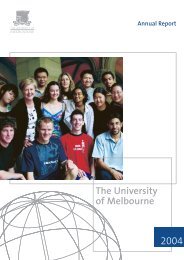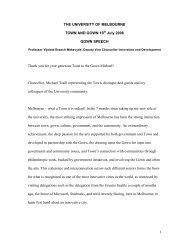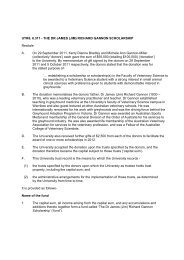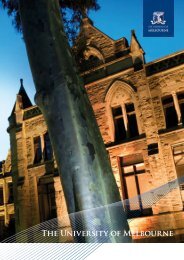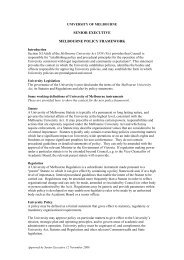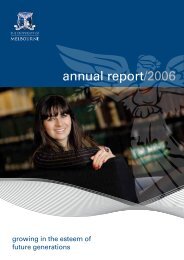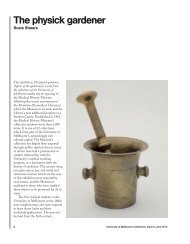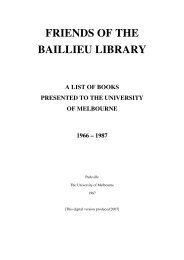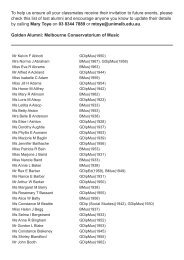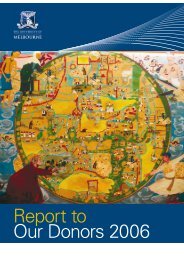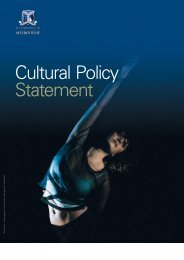2010 International Undergraduate Prospectus nts. u.au
2010 International Undergraduate Prospectus nts. u.au
2010 International Undergraduate Prospectus nts. u.au
Create successful ePaper yourself
Turn your PDF publications into a flip-book with our unique Google optimized e-Paper software.
62<br />
Did you know?<br />
The Bachelor of Film and<br />
Television promotes independent<br />
learning with a large component<br />
of the course focused on<br />
practical screen production.<br />
As a student you will have<br />
access to equipment for<br />
broadcast-quality video, 16mm<br />
film production and animation<br />
and visual effects studios.<br />
Stude<strong>nts</strong> and graduates<br />
are successful in local and<br />
international film festivals and<br />
many have gone on to establish<br />
fruitful and high-profile careers.<br />
Bachelor of Film and<br />
Television<br />
Duration<br />
3 years full-time<br />
1 year Honours available<br />
Fees<br />
See page 104<br />
Campus<br />
VCA (Southbank) Campus<br />
Entry requireme<strong>nts</strong><br />
See pages 119–125<br />
About the Bachelor of Film<br />
and Television<br />
The Bachelor of Film and Television<br />
gives stude<strong>nts</strong> the skills to create screen<br />
programs with high artistic and technical<br />
standards. Stude<strong>nts</strong> are encouraged to<br />
be innovative, to experiment, to explore<br />
ideas and develop the expertise to express<br />
ideas for an <strong>au</strong>dience. Stude<strong>nts</strong> gain a<br />
broad understanding of the motion picture<br />
industry, and development of world cinema.<br />
The Bachelor of Film and Television<br />
promotes independent learning with a<br />
large component of the course focused<br />
on practical screen production. Stude<strong>nts</strong><br />
develop production and crewing skills<br />
with a special emphasis on screenwriting,<br />
direction and editing. The degree aims to<br />
produce well-rounded graduates who can<br />
generate and develop ideas and who have<br />
a comprehensive understanding of the<br />
specialist skills of a number of craft areas.<br />
VCA Film and Television is located at the<br />
Southbank campus in a modern, purposedesigned<br />
building, with equipment for<br />
broadcast-quality video and 16mm film<br />
production together with fully equipped<br />
animation and visual effects studios. There<br />
are two film studios, digital post-production<br />
facilities, two rushes screening rooms, a<br />
90-seat cinema and access to a 220 seat<br />
cinema/recital hall.<br />
Bachelor of Film and Television conveners<br />
are all practising filmmakers. Classes<br />
with Film and Television’s academics are<br />
regularly complemented by many local<br />
and international cinema practitioners and<br />
specialists who visit the school to conduct<br />
guest sessions.<br />
VCA Film and Television has gained an<br />
international reputation for producing<br />
high-achieving graduates. Stude<strong>nts</strong> and<br />
graduates are successful in local and<br />
international film festivals and many have<br />
gone on to establish fruitful and high profile<br />
careers.<br />
More information is available at:<br />
www.vca.unimelb.edu.<strong>au</strong><br />
Scholarships<br />
The Faculty of the VCA and Music enjoys<br />
substantial support from a number of<br />
generous donors and consequently has a<br />
broad range of scholarships, awards and<br />
prizes on offer to its stude<strong>nts</strong>. Facultywide<br />
scholarships, awards and prizes are<br />
available including the Commonwealth<br />
Learning Scholarships, as well as coursespecific<br />
scholarships, awards and prizes.<br />
VCA Film and Television has a number of<br />
merit-based awards for stude<strong>nts</strong>’ work.<br />
Some are presented at script stage with<br />
the remainder awarded for completed<br />
productions. There is no application for<br />
these awards, ranging from $500 to $5000,<br />
which are determined by a panel. Stude<strong>nts</strong><br />
in the Bachelor of Film and Television<br />
are also eligible to apply for a number of<br />
centrally administered VCA scholarships.<br />
See www.vca.unimelb.edu.<strong>au</strong> for more<br />
information.<br />
Careers<br />
Stude<strong>nts</strong> are encouraged to be innovative,<br />
to experiment, to explore ideas and develop<br />
the expertise to express their ideas for an<br />
<strong>au</strong>dience. The VCA promotes independent<br />
learning with a large component of its<br />
courses focused on practical screen<br />
production. Stude<strong>nts</strong> develop crewing skills<br />
with a special emphasis on screenwriting,<br />
direction and editing. The VCA aims to<br />
produce well-rounded graduates who can<br />
generate and develop ideas and who also<br />
have skills in a number of craft areas.<br />
VCA Film and Television has an international<br />
reputation for the high quality of its<br />
graduates and its student productions.<br />
Our stude<strong>nts</strong> are successful in local<br />
and international film festivals, winning<br />
numerous awards with their productions.<br />
Most VCA graduates become employed<br />
in the industry, often working initially in an<br />
assistant capacity as freelancers. Many<br />
stude<strong>nts</strong> go on to develop high-profile<br />
careers in the film, television or allied<br />
industries.<br />
Professional and international<br />
degree recognition<br />
The VCA enjoys wide recognition among the<br />
international arts community for its courses.<br />
It is a member of CILECT, the <strong>International</strong><br />
Association of Film and Television Schools,<br />
as well as the European League of Institutes<br />
of the Arts (ELIA), the <strong>International</strong> Council<br />
of Fine Arts Deans (ICFAD), and is an<br />
international affiliate of the Association of<br />
Independent Colleges of Art and Design.<br />
Depth<br />
Developing your specialisation<br />
During this rigourous three-year course<br />
you will develop creative, technical and<br />
analytical skills by attending small-group<br />
workshops, lectures and master-classes<br />
focused on experiential learning. You will<br />
be trained to a high level in video and<br />
16mm film production techniques, including<br />
cinematography, sound recording and nonlinear<br />
editing.<br />
Practical skills are developed in short<br />
productions, with your collaborative skills<br />
developed through crewing on fellow<br />
stude<strong>nts</strong>’ productions. However, the course<br />
focus is on creativity for the screen and




